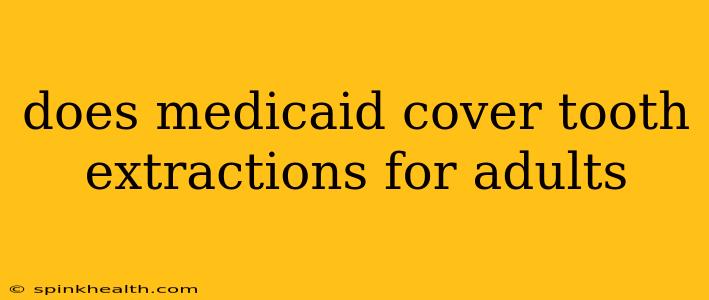Does Medicaid Cover Tooth Extractions for Adults? A Comprehensive Guide
The gnawing worry of a painful toothache is bad enough, but the added stress of wondering how you'll afford treatment can be unbearable. Many adults rely on Medicaid for healthcare, and a common question that arises is: Does Medicaid cover tooth extractions for adults? The short answer is: it depends. While Medicaid aims to provide essential healthcare, the specifics vary significantly depending on your state and the circumstances of your dental emergency. Let's delve deeper into the intricacies of Medicaid dental coverage for adults and address some common concerns.
What Does Medicaid Cover?
Medicaid, a joint federal and state program, offers healthcare coverage to low-income individuals and families. While federal guidelines establish a minimum level of coverage, each state has the authority to design its own Medicaid program, leading to significant variations in benefits. This means that the dental services covered under Medicaid can differ dramatically from state to state. Some states offer comprehensive dental coverage for adults, including extractions, while others provide only limited emergency dental care. Even within a state, eligibility requirements and benefit packages might vary further based on your specific circumstances.
Does Medicaid Cover Tooth Extractions if Necessary Due to an Accident?
This is a critical point to consider. While routine extractions might not always be covered, Medicaid is far more likely to cover extractions deemed medically necessary due to an accident or injury. Think of it this way: if a tooth needs extracting because of a car accident, the likelihood of Medicaid coverage significantly increases. It's essential to prove the medical necessity and link the extraction directly to the injury. Proper documentation from your dentist and possibly medical records relating to the accident are crucial in such instances.
What about Routine Tooth Extractions?
This is where the variability among states becomes most apparent. Some states might cover routine extractions under their Medicaid program, but others might only cover them in specific circumstances, such as cases of severe infection or decay endangering overall health. In these cases, documentation from your dentist outlining the medical necessity of the extraction will be crucial to securing approval from Medicaid.
What are the Eligibility Requirements?
Eligibility for Medicaid varies widely depending on your income, family size, and other factors. Each state sets its own income limits, so you must check with your state's Medicaid agency to determine if you meet the requirements. Income verification, residency proof, and other documentation will typically be needed.
How to Find Out What Your State Covers?
This is the most critical step. Don't rely on assumptions! Contact your state's Medicaid office directly. Their website should have detailed information regarding dental coverage, or you can contact them via phone. They can clarify exactly what procedures are covered under your state’s Medicaid plan and what documentation you'll need to submit.
Are there alternative options for affordable dental care?
If Medicaid doesn't cover the procedure, don't lose hope. Many community health centers and non-profit organizations offer discounted or sliding-scale dental services based on your income. These centers are dedicated to providing affordable healthcare to underserved populations and can be a valuable resource. Your local health department or social services agency can offer information on these resources in your area.
In conclusion, determining if Medicaid covers tooth extractions for adults requires a thorough investigation into your state's specific Medicaid program. Contact your state Medicaid office, obtain necessary documentation, and don't hesitate to explore other affordable dental care options if your state’s program doesn't fully cover the needed treatment. Remember, proactive research and communication are key to navigating the complex world of healthcare coverage.

